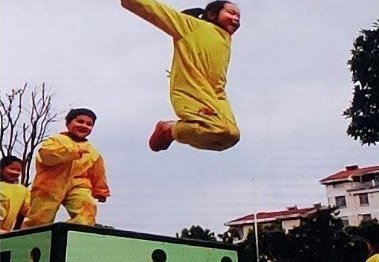
Part three in my five-part blog series reporting on my experience attending the first annual True Play Conference in Anji, China will focus on the need for a global true play revolution (to read part one and two click here). The conference began with a presentation by Ms. Cheng Xuegin, Director of the Anji Childhood Education Research Center and founder of the Anji Play approach to early childhood education. Ms. Cheng began by discussing five components of the global crisis in early education:
(1) lack of access for the most marginalized communities, (2) current approaches based on outdated views of learning and focus on increasingly irrelevant skills, (3) early educators treated as unskilled workers and not empowered, (4) the right of children to authentic experiences of deep learning is not part of the design or priorities of current systems, and (5) institutions, organizations, and experts have created and benefit from systems that will not change from within regardless how they redefine skill sets.

Anyone familiar with early childhood education in the United States can attest to how these issues (and others) have negatively impacted children, their families, and early childhood teachers. The spread of the Global Education Reform Movement, aka GERM, has fueled the crisis not only in early education but in public education as a democratic ideal. If you compare the five global features of GERM articulated by Pasi Sahlberg with the five issues Ms. Cheng described, you can see how GERM contributes to the crisis.
| Five Features of GERM | Five Components of the Global Crisis in ECE |
| Standardization | The right of children to authentic experiences of deep learning is not part of the design or priorities of current systems. |
| Focus on core subjects | Current approaches based on outdated views of learning and focus on increasing irrelevant skills. |
| The search for low-risk ways to reach learning goals | Lack of access for the most marginalized communities |
| Use of corporate management models | Early educators treated as unskilled and unempowered |
| Test-based accountability | Institutions, organizations, and experts have created and benefit from systems that will not change from within regardless of how they redefine skill sets. |
As Ms. Cheng and the teachers in Anji county worked to address the crisis in early education, they described a shift in early care education from no play to false play to true play.

Ms. Cheng shared her journey to discover true play in Anji. She began by looking at children’s eyes, and she soon realized that their eyes only smiled when they engaged in true play. No play and false play, which was the play teachers thought children should engage in, did not lead to eyes that smiled. Only when the children were free to engage in self-determined play, with a minimally structured environment did their eyes truly smile.
The distinction between true play and false play is crucial to fully understand why the global true play revolution is vital to the health and well-being of young children across the globe. False play is the norm in the U.S. and likely in many other countries. Children can play with toys selected by the teacher that typically have one function. Or they play outside on plastic play structures that do not provide the freedom for children to explore and become deeply engaged. We need to go beyond false play experiences and ensure all children have the right to true play.
What Ms. Cheng and her teachers discovered through observations of children during the changes to play, led to a pedagogical revolution that has fueled a global true play revolution.
“In this Pedagogical Revolution, we remove the restrictions of children’s play and discover children’s ability to keep on renewing our cognizance. Cognizance towards children, cognizance towards children’s learning, cognizance towards the value of the environment, cognizance towards teacher’s role, cognizance towards educational ecology.”

A global true play revolution will allow adults to learn from children instead of creating experiences that serve the needs of adults. As we learn from children engaging in true play, we provide experiences that protect childhood from GERM and other education reform efforts that do not prioritize the needs of children. Our efforts to protect childhood can only succeed during a global true play revolution…I hope you will join me and others as we work to spark the revolution and ensure all children have the right to true play!
Are you interested in engaging in true play advocacy?
Do you want to strategize on how to protect childhood?
Are you passionate about joining the global true play revolution?
If the answer is yes, then we invite you to join us at the first ECE Summer Organizing Leadership Institute July 7-10 in Washington DC. For more information, visit https://dey.org/early-childhood-summer-organizing-institute/.
